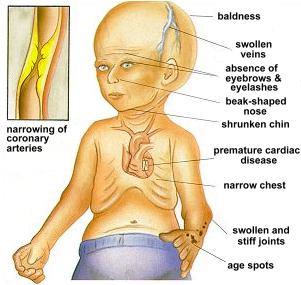
British researchers from Durham University have found a way of slowing down ageing in individual cells, which will be reflected in a future “forever young” pill.
Durham University scientists believe their work could help the elderly stay healthy well into their twilight years, as well as help children suffering from progeria, a rare condition that causes them to grow old before their time.
Professor Chris Hutchison said: “The findings are at a very early stage but they show the potential for helping people live more comfortable and less painful lives when they reach 70 or 80 years of age and beyond.”
Prof. Chris Hutchison used N-acetyl cysteine to slow the ageing of cells taken from children with Hutchinson Gilford Progeria Syndrome (HGPS).
Progeria is a rare genetic condition in which huge amounts of DNA damage cause cells to quickly age and die.
As a result, children rapidly grow old and frail before dying of “old age” between the age of eight and 21.

Hayley Okines, from Bexhill, East Sussex, is known for spreading awareness of progeria.
In January 2011, Hayley Okinesmwas 13, an age she was not expected to reach.
Hayley Okines was diagnosed in 1999 and her condition causes her to age eight times faster than the average person.
Some people have speculated that the author F. Scott Fitzgerald based his story The Curious Case Of Benjamin Button on HGPS.
Treating cells with a drug normally given to people who have taken paracetamol overdoses slowed down the ageing process, allowing them to grow normally.
The reasearchers hope that the drug, N-acetyl cysteine, can one day be used to treat HGPS, improving the quality of life for children.
It is also believed that, with many of the problems of HGPS, such as hardening of the arteries, stiffness of the joints and hip dislocations, also present in normal ageing, N-acetyl cysteine might have a much more general use.
While N-acetyl cysteine may not help people live longer, it could make a person’s later years more pleasant.
Prof. Chris Hutchison said: “Our findings could be an important step to helping both children with progeria and older people to live lives that are less debilitating in terms of health problems.”
Professor James Goodwin, of charity Age UK, said the research offers valuable insights into the ageing process.
Prof James Goodwin said: “Although it’s fantastic that people are living longer than ever, we know that on average men can expect to live 7.4 years and women 9 years at the end of their lives with a disability.
“To mitigate the years we spend in ill health, it is clear that one of the most promising areas of research centres on slowing down the ageing process and tackling age-related illness.”
The approach is not the only one that holds promise.
Last year, Ronald DePinho, a Harvard University doctor, made old mice young again.
At the start of the experiments, the animals’ skin, brains, guts and other organs were at a stage equivalent to those of an 80-year-old person.
Within just two months of being given a drug that switches on a key enzyme, the mice had grown so many new cells that they had almost completely rejuvenated.
Remarkably, the male mice went from being infertile to fathering large litters.
Speaking this summer at the Cheltenham Science Festival, Professor Linda Partridge, a University College London expert in the genetics of ageing, said that science is moving so quickly that people will soon take a daily pill from middle age to prevent many of the ills of old age.
However, Prof. Linda Partridge said that any drugs would have to be shown to be extremely safe before they were given to healthy people to combat ageing.